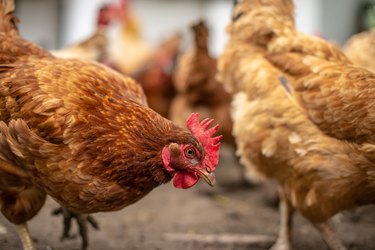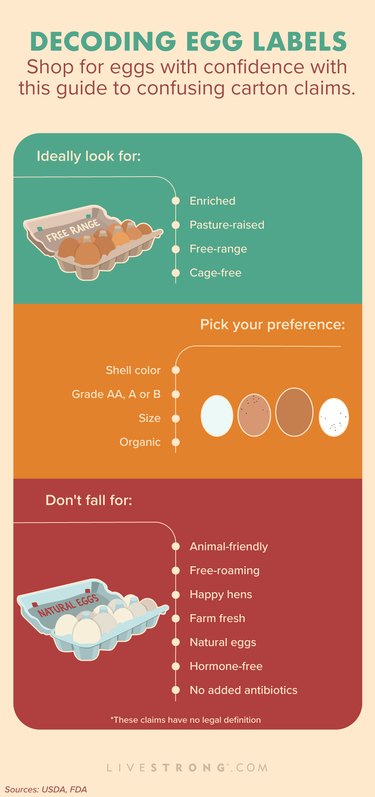
Shopping for eggs can be a total headache. In addition to choices that involve size, color and grade, eggs may carry labels such as cage-free, free-range, pasture-raised, vegetarian-fed, enriched or organic.
Read on for some clarity with which you can sort through these label claims so you can buy your eggs with confidence.
Video of the Day
Video of the Day
Related Reading
Egg Shell Color
When shopping for eggs, you'll have a choice of color — and there's a common misconception that brown eggs are a better choice than white ones.
"There are no significant nutritional differences between white and brown eggs," Kristen Smith, RD, spokesperson for Academy of Nutrition and Dietetics and founder of 360 Family Nutrition, tells LIVESTRONG.com. "The difference in shell color is simply indicating that a different breed of chicken produced the egg."
In fact, hens can produce white, cream, blue, green, brown or even speckled eggs, although grocery stores most often carry brown and white eggs. Compared to white eggs, brown eggs tend to be bigger in size, according to the USDA, and are usually more expensive because they cost more to produce.

Egg Grade
Consumers also have a choice of egg grade, a measure of interior egg quality and shell appearance.
Egg packers may label their eggs as "Grade AA" or "Grade A," or voluntarily use the USDA grading service, which evaluates plant sanitation, egg processing procedures and storage temperatures as well as egg weight and quality. Eggs that have been officially graded by these standards can be labeled with the USDA Grade Shield, and are graded as AA, A or B.
"Eggs sold at the retail must meet the standards for Grade B or better," says Jen Houchins, PhD, RD, director of nutrition research with the American Egg Board's Egg Nutrition Center.
"Most eggs sold in supermarkets today are Grade AA or A. Although Grade B eggs are just as wholesome to eat, they rate lower in appearance — and so few Grade B eggs find their way to the supermarket. Most go to institutional egg users such as bakeries or foodservice operations."
Egg Size and Nutritional Value
In most stores, shoppers will also have a choice of egg size. This is not based on egg dimensions, but by the net weight per dozen eggs. Sizes may be small, medium, large, extra-large or jumbo.
Egg size doesn't affect quality, although the nutritional value of the egg changes in proportion to its size, per the USDA.
Calories | Total Fat | Protein | Cholesterol | |
|---|---|---|---|---|
Small Egg | 54 | 4 g | 5 g | 141 mg |
Large Egg | 72 | 5 g | 6 g | 186 mg |
Jumbo Egg | 90 | 6 g | 8 g | 234 mg |
Eggs are a relatively low-cost, nutritious food and a source of high-quality protein. They are also good sources of B vitamins, selenium, vitamins A, D, E and K, as well as choline, a nutrient particularly important for brain health.
Plus, eggs are a source of important antioxidants, according to an October 2015 review in Nutrients.
Conventional Eggs
Supermarket eggs are categorized according to how the laying hens were raised. While sorting through these claims can be a challenge, Houchins shares some pretty straightforward advice.
"Label claims such as 'conventional,' 'cage-free,' 'pasture-raised,' 'free-range,' and even 'organic' simply refer to the way the eggs were farmed, and unless the feed is [noted as] fortified, do not denote meaningful nutritional differences."
But the farming practices — including how the laying hens were raised and fed — matter to many consumers and influence the types of eggs they buy.
Conventional or caged eggs are laid by hens raised in cages their entire lives and fed standard food — which is usually a corn and soybean mixture enhanced with vitamins and minerals, according to the Division of Agriculture and Natural Resources at the University of California.
While the term "conventional" is not typically used on egg cartons, these eggs laid by caged hens tend to be the lowest-cost supermarket eggs.
Cage-Free Eggs

In larger grocery stores, you'll typically see egg choices beyond the caged or conventional ones — and cage-free eggs are a common option. When this voluntary claim is used on eggs that possess the USDA Grade Shield, strict quality and labeling standards must be met.
To qualify for the cage-free label, laying hens:
- must live within indoor buildings, such as barns or other free-range pens
- must be allowed to exhibit natural behaviors including having areas to scratch, perch and nest
- have unlimited access to food, water and litter
- must be protected from predators
Free-Range Eggs
Another common egg choice is free-range, a term that needs to meet strict criteria if the eggs also possess the USDA Grade Shield.
Free-range eggs are produced by hens that have:
- indoor housing that allows freedom to roam
- unlimited access to food and water
- continuous outdoor access during their laying cycle
In addition to the standard feed of grains, these hens may be allowed to forage to supplement their diet with insects and wild plants. Even so, USDA's free-range standards do not guarantee the hen spends time outside or eats wild food.
Pasture-Raised Eggs
The term "pasture-raised" is not regulated by the USDA but is defined by a third-party certification program through Humane Farm Animal Care (HFAC). This organization helps consumers decide on products based on how farm animals are treated.
If standards are met for free-range and pasture-raised eggs, which include access to an outside area covered with living vegetation, the HFAC seal can be used on the label, along with the "Certified Humane Raised and Handled" logo.
A bonus: Pasture-raised eggs could have higher amounts of antioxidants, vitamin A and omega-3 fats, according to a research report in the January 2021 issue of ACS Food Science and Technology.
Organic Eggs
Most supermarkets have organic eggs as an option. And while the USDA has few rules that govern the diet of laying hens, certified organic birds are an exception.
The USDA's National Organic Program has established rules for organic food production, including organic eggs, and hens producing organic eggs:
- must receive feed that is made from certified organic ingredients
- must be free to roam outdoors
Organic eggs are not necessarily more nutritious compared to non-organic eggs. According to a review in the December 2017 issue of Nutrition and Food Technology, there are few studies that compare conventional and organic eggs, and some have inconsistent results.
Freshness Tip
Have you ever wondered what the numbers on the side of the egg carton mean? All egg cartons bearing the USDA Grade Shield require lot numbering, which provides freshness information.
Dates are 3-digit and range from 001, which means January 1, through 365 for December 31. Eggs can be stored in the refrigerator 4 to 5 weeks beyond this date, per the USDA. The "Sell By" or "Use By" dates are not required to be listed on the egg containers.
Vegetarian-Fed Eggs
Vegetarian-fed eggs may be another option available at the market. These eggs are a product of laying hens that were not fed animal byproducts, though this doesn't necessarily mean they're a higher quality choice.
"There is little research to support a hen fed a vegetarian diet will produce a more nutritious egg compared to a hen fed a standard feed diet," Smith says. Still, a hen's diet may be an important selling point for some consumers.
Enriched Eggs
While most eggs share similar nutrient contents despite different hen housing practices, enriching hen feed can change egg quality, says Moe Schlachter, RDN, a spokesperson for the Texas Academy of Nutrition and Dietetics and president of Houston Family Nutrition.
"A hen could be fed a diet enriched with vitamin E, and naturally, the hen's metabolism would deposit more vitamin E into its eggs to create vitamin E-enriched eggs."
Houchins agrees, "The only way to produce eggs with higher levels of nutrients is by feeding the hens that lay the eggs a diet of nutritionally fortified feed. In such cases, the eggs are marketed as nutrient- or nutritionally enhanced, and their packaging will specify nutrient content."
Hen feed can also be enriched with nutrients that increase the levels of antioxidants in the eggs and make the yolk richer in color, according to a report in 2012 issue of the American Journal of Food Technology.
Tip
While the pricier enriched eggs may seem like a good health investment, the benefits of the extra omega-3 fats, vitamin E or other antioxidants are only helpful if you incorporate enough eggs into your diet. So if you are not eating eggs daily — or if your doctor tells you to eat eggs sparingly — enriched eggs may not add much value to your overall diet.
Other Claims
Other claims listed on egg cartons may be important to certain consumers, including kosher eggs — which have to meet specific kosher guidelines — and local eggs, which must come from a flock less than 400 miles within the same state or egg processing facility.
Pasteurized shell eggs, which have been heated just enough to kill harmful bacteria but not coagulate the egg, may also be available.
Claims to Ignore
Be wary of claims that lack any legal definition or are meant to confuse the consumer — these are meaningless. For example, according to the USDA, there is no legal definition for:
- "animal-friendly eggs"
- "free-roaming eggs"
- "happy hens"
- "farm fresh eggs"
- "natural eggs"
- "hormone-free eggs"
- "no added antibiotics"
"Even though people often associate them with healthfulness, these labels have no true meaning when slapped onto an egg carton," Schlachter says.
Consumers can also ignore claims for hormone-free eggs. "The claim that an egg is 'hormone-free' is just a marketing tool, since by law, no poultry is allowed to be given hormones," Smith says.
The claim of "no added antibiotics" is not too impressive either, because the FDA strictly regulates antibiotic use in laying hens, and restricts the sale of eggs with antibiotic residues to consumers.
So, What Are the Best Eggs to Buy?
While sorting through all the claims and information on egg containers can be confusing, there are some ways to simplify the purchasing process.
"The best thing to look for on an egg label is the USDA Grade Shield," Schlachter says. "Then, even though your eggs are not any more nutritious than another egg type, at least they're meeting the standards for egg quality."
And remember: Pricey eggs are not necessarily better, Houchins says. "The cost of one type of egg relative to another type of egg is not an indicator of nutritional value. Instead, it is a reflection of the farming method used to produce the egg."
The best strategy is to make your decision based on the intended use of the egg, your personal preferences and your budget.
For instance, if it's important to you that your eggs come from humanely raised hens, then you may want to purchase free-range or pasture-raised eggs — if you are willing to pay the higher cost.
If you are seeking the most nutritious egg, enriched eggs are your best bet.

- University of California: Division of Agricultural and Natural Resources: "Egg Basics for the Consumer: Packaging, Storage and Nutritional Information"
- Humane Farm Animal Care: Animal Care Standards: "Egg Laying Hens"
- United States Department of Agriculture: "Labeling Guidelines for Fresh Eggs"
- American Journal of Food Technology: "Modified or Enriched Eggs: A Smart Approach in Egg Industry: A Review"
- Nutrition and Food Technology: Open Access: "A Review of Nutritional Characteristics of Organic Animal Foods: Eggs, Milk, and Meat"
- Illinois Department of Agriculture: "Egg Carton Labeling Terms"
- United States Department of Agriculture: Food Safety and Inspection Services: "Questions and Answers"
- Nutrients:"Hen Egg as an Antioxidant Food Commodity: A Review"
- Renewable Agriculture and Food Systems: "Vitamins A, E and Fatty Acid Composition of the Eggs of Caged Hens and Pastured Hens"
- Which Are Better for You, Brown Eggs or White Eggs?
- What Is the Difference Between Omega-3 Eggs and Regular Layer Eggs?
- US Department of Agriculture: "A Carton of Eggs - A True Baker's Dozen"
- US Department of Agriculture: "Questions and Answers – USDA Shell Egg Grading Service"
- American Egg Board: "Cracking the Egg Code"
- United Egg Producers: "Antibiotics on the Farm"